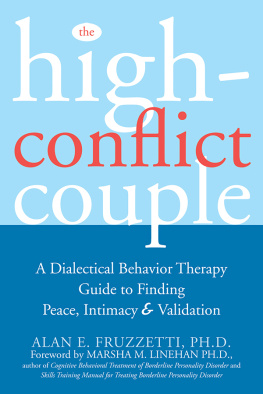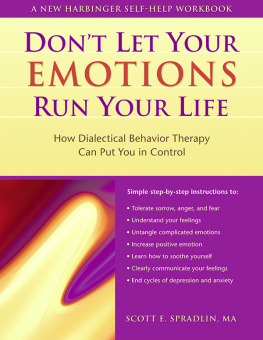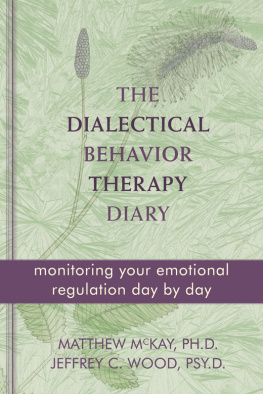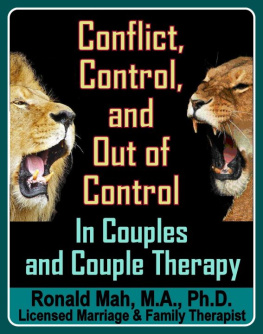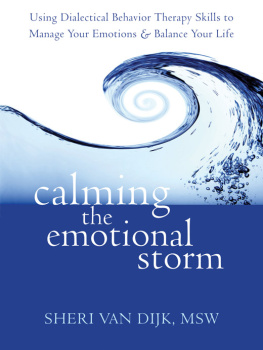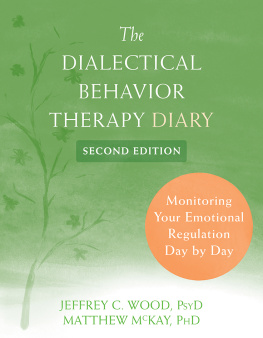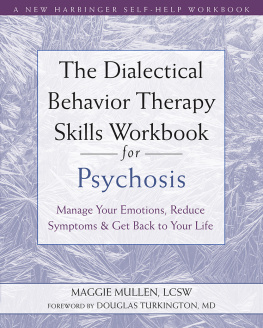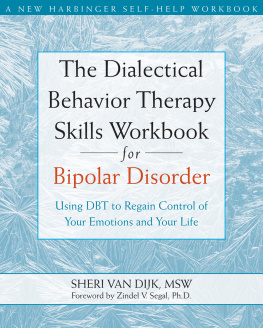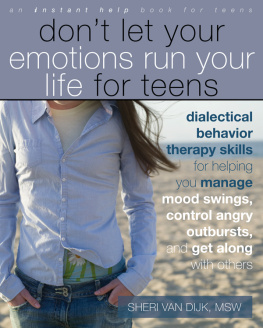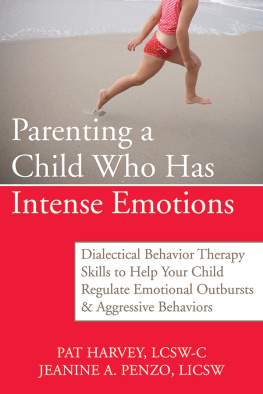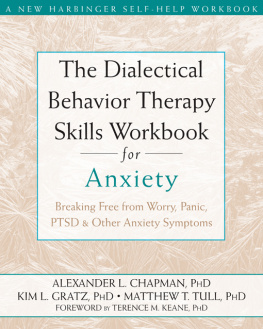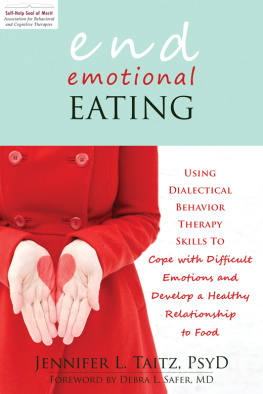The High-Conflict Couple
Dialectical Behavior Therapy Guide to Finding Peace, Intimacy & Validation
This is a long awaited book! Fruzzetti is a master clinician who does rigorous science in order to provide those of us doing treatment and those in need of it something that works. This is hope for all of us working with individuals, couples and families who suffer. Thank you, Alan, for this timely and important work.
Suzanne Witterholt, MD, distinguished fellow of the American Psychiatric Association and director of Ananda Services for Dialectical Behavior Therapy in the Department of Psychiatry at the University of Minnesota
Fruzzetti is a leader in work with high-conflict couples and families. This much-awaited book provides an opportunity to learn his techniques and strategies, presented in his unique teaching style that is so effective. The book is a must for every DBT program as well as all those working within the field.
Perry D. Hoffman, Ph.D., president of the National Education Alliance for Borderline Personality Disorder, New York
The High Conflict Couple performs a major public service. Fruzzettis approach starts with an important principle: that dysregulated emotions are the core difficulty for high-conflict couples. From this he provides step-by-step practical methods designed to enhance acceptance, intimacy, and communication based on the latest research regarding emotion regulation and his own vast experience in working with couples and families. In essence, this is an excellent book, useful for both clinicians and couples regardless of the severity of their difficulties.
Thomas R. Lynch, Ph.D., associate professor in the Departments of Psychiatry and Psychology and Neuroscience and director of the Cognitive Behavior Research and Treatment Program at Duke University
A warm and professional guide following in the tradition of acceptance and compassion. A book on how to handle love and stay connected even in difficult circumstances. We have waited for it!
Anna Kver, psychologist and author with Karolinska Hospital, Stockholm, Sweden
The High-Conflict Couple
Dialectical Behavior Therapy Guide to Finding Peace, Intimacy & Validation
Alan E. Fruzzetti, Ph.D.
New Harbinger Publications
Publishers Note
This publication is designed to provide accurate and authoritative information in regard to the subject matter covered. It is sold with the understanding that the publisher is not engaged in rendering psychological, financial, legal, or other professional services. If expert assistance or counseling is needed, the services of a competent professional should be sought.
Distributed in Canada by Raincoast Books
Copyright 2006 by Alan E. Fruzzetti
New Harbinger Publications, Inc.
5674 Shattuck Avenue
Oakland, CA 94609 www.newharbinger.com
Cover design by Amy Shoup; Acquired by Catharine Sutker; Text design by Tracy Marie Carlson; Edited by Brady Kahn
All Rights Reserved
Library of Congress Cataloging-in-Publication Data
ISBN-13: 978-1-57224-450-4
ISBN-10: 1-5722-4450-X
ISBN-13: 978-1-60882-426-7 Epub
For my mentors, Dr. Marsha M. Linehan and the late Dr. Neil S. Jacobson
Contents
Marsha M. Linehan, Ph.D.
No relationship has only smooth sailing. All relationships have conflict and an excess of negative emotion, so problems in intimate relationships affect just about everyone at one time or another. Being in a high-conflict relationship is exhausting and leaves both partners feeling miserable and alone. Being in an unhappy and distressed partnership is associated with increased rates of depression, anxiety, and substance use. Children in homes with great conflict are more likely to be troubled and even suicidal. This book addresses how to improve our intimate relationships, and in turn, our own and our familys well-being.
The book is based on the principles of dialectical behavior therapy (DBT), a treatment that has a large number of clinical trials demonstrating its effectiveness. DBT was developed at the University of Washington and Alan Fruzzetti was part of the very first DBT treatment team. He and the other members of the team gave the first critical feedback on the treatment and were major contributors to the development of the treatment in its current form. Alan has been working with DBT for twenty years, teaching it and adapting it for couples, families, and adolescents.. Almost all of the research to date has focused on applying DBT to individuals, with few studies including families. Thus, there is a real absence in the literature: how to apply DBT to couples and families.
Dr. Fruzzetti is an expert in couple and family therapy and in research on intimate relationships. He is at the fore of work in this area, integrating mindfulness, emotion regulation, accurate expression, and validation into a coherent package. He has written dozens of professional articles and book chapters, both about DBT and about couple and family interactions and treatments from a DBT perspective.
In this book, Alan takes his expertise in working with couples and integrates it with his expertise in DBT. Like DBT, the book takes a nonjudgmental approach that promotes both acceptance of yourself and your partner, such as being mindful of yourself and your partner, and being more self-validating. It also focuses on change, such as reducing invalidation and negative responses to yourself and your partner while increasing your own emotion self-regulation, improving your ability to express yourself accurately, and building your skills to manage problems more effectively. The book also focuses heavily on the integration of these two strategies (acceptance and change), really helping you and your partner to be more validating toward each other.
It is very important to note that this book is based on sound principles and research, including research on basic emotional processes, couple interaction research, and the many studies evaluating dialectical behavior therapy. Very few books like this are actually based on research, so that puts this book into a very elite group.
The approach in this book is sensitive to the needs of struggling spouses and partners who have a lot of hurts and hopes. It addresses a broad variety of situations that couples find themselves in and provides thoughtful and practical ideas and practice exercises to help people decrease destructive conflict and find more peace and intimacy in their relationships.
Most people are lucky to have one real mentor in their lives. I have been very fortunate to have had several. Relevant to this book, in particular, is the inspiration I have received from my mentor, friend, and colleague Marsha Linehan, whose development of dialectical behavior therapy (DBT) is one of the truly innovative achievements in psychotherapy in the past couple of decades. In addition, my former research advisor and mentor Neil Jacobson, who died much too young in 1999, taught me a great deal about couples therapy, couple interaction, and about research, and inspired me to try new ideas and approaches to complex problems. These are two people whose shoes I cannot hope to fill.
My friend and colleague Perry Hoffman has for years provided support and friendship and has collaborated with me to adapt DBT to work with families. Her tirelessness for alleviating suffering in families continues to guide me. Many other colleagues and friends have contributed to my thinking about DBT and how to apply DBT to the problems of couples and families, provided feedback about the ideas in this book, given feedback about related papers or earlier drafts of the chapters in this book, and/or provided helpful and ongoing encouragement. These include, in particular, Linda Dimeff, Christine Foertsch, Anna Kver, Beverly Long, Elizabeth Malmquist, Richelle Moen-Moore, Alec Miller, sa Nilsonne, Anita Olsson, Joan Russo, Renee Schneider, Doug Snyder, Liz Simpson, Charlie Swenson, and Suzanne Witterholt.

